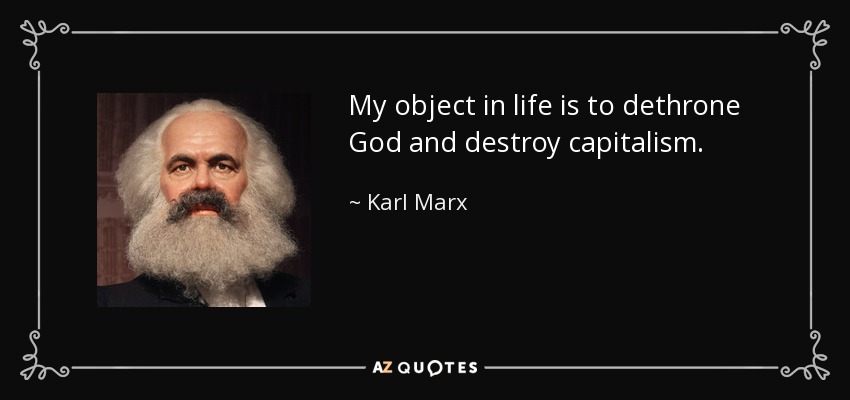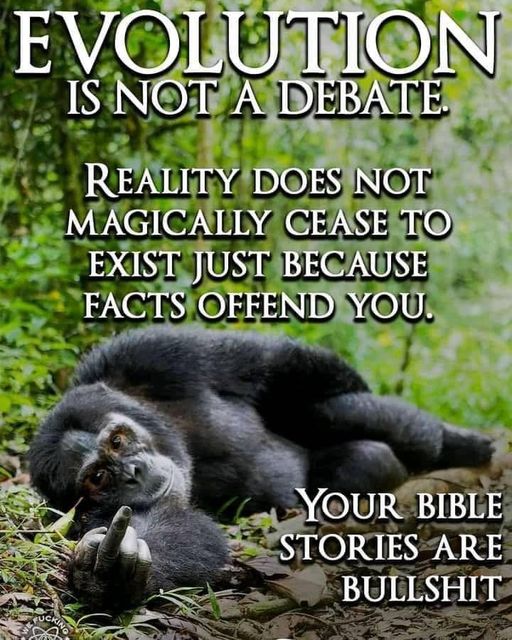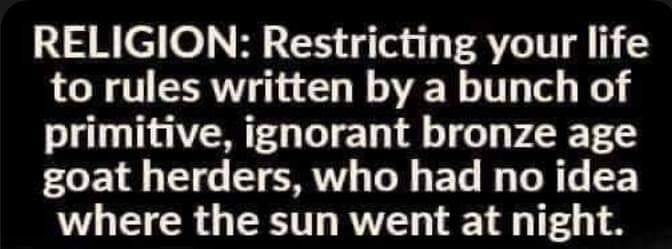Evolution is not a debate.
Feb 9, 2022 03:20:17 #
Feb 9, 2022 03:42:43 #
PeterS wrote:
Just for a change of pace though for you conservatives I'm sure it's all part of the same.
Evolution has many great debates...
One of the reasons I find the field so interesting...
Check out the aquatic hominid theory... It explains (or attempts to) some of the weirder characteristics unique to homo sapiens...

Feb 9, 2022 03:59:43 #
Canuckus Deploracus wrote:
Evolution has many great debates...
One of the reasons I find the field so interesting...
Check out the aquatic hominid theory... It explains (or attempts to) some of the weirder characteristics unique to homo sapiens...

One of the reasons I find the field so interesting...
Check out the aquatic hominid theory... It explains (or attempts to) some of the weirder characteristics unique to homo sapiens...

The trashing of the religious belief systems of others has only one purpose . Division , derision, friction,
and blocking of intelligent and constructive dialogue. In a word, chaos. But of course we know that chaos
(departure from fact) is in fact the new Dem Party.
Feb 9, 2022 04:41:30 #
PeterS wrote:
Just for a change of pace though for you conservatives I'm sure it's all part of the same.
Obviously you've never heard of Parmenides ("Ex nihilo nihil fit"), Lucretius, Aristotle, Plato, Thomas Aquinas, John Philoponus, St. Bonaventure, or the Medieval Muslim scholars, Al-Kindi and Al-Ghazali.
Everything that begins to exist has a cause.
The universe began to exist.
Therefore, the universe was caused to exist.
Something caused to exist has a purpose,
the universe was caused to exist,
therefore, the universe has a purpose.
To every thing there is a season, and a time to every purpose under the heaven:
Ecclesiastes 3: 1
"Then we shall be able to take part in the discussion of the question of why it is that we and the universe exist.
If we find the answer to that, it would be the ultimate triumph of human reason - for then we would know the mind of God. . . . . ."
Stephen Hawking


Feb 9, 2022 05:45:06 #
PeterS wrote:
Just for a change of pace though for you conservatives I'm sure it's all part of the same.
Atheists should perhaps rethink their Godless universe position and at least give consideration to the possibility that there is, indeed, an intelligence in charge of things.
The reason for this is that in a truly Darwinian Universe such as they envision, There are a number of brainless Liberal Atheists here on OPP that would become as extinct as the Dodo Bird faster than you can say "Origin of Species."
Feb 9, 2022 05:54:49 #
Blade_Runner wrote:
Obviously you've never heard of Parmenides ( i &qu... (show quote)
Everything that begins to exist has a cause.
Unfortunately there is no proof for this ..
Interesting theory though...
You might find this amusing...Got it from a religious discussion group...

Feb 9, 2022 11:44:53 #
skyrider wrote:
The trashing of the religious belief systems of others has only one purpose . Division , derision, friction,
and blocking of intelligent and constructive dialogue. In a word, chaos. But of course we know that chaos
(departure from fact) is in fact the new Dem Party.
and blocking of intelligent and constructive dialogue. In a word, chaos. But of course we know that chaos
(departure from fact) is in fact the new Dem Party.
sky, There are many contradictions in comparing faith with science. I knew an Orthodox Jew that taught math and philosophy at the Hebrew University in Israel. He was a genuine prodigy that graduated With CCNY in New York at sixteen years old, even though his parents tried to hold him back. I asked him how he deals with these contradictions. His answer surprised me. He said that he studies religion as though science didn't exist, and studied science as though religion didn't exist. That didn't make any sense to me, but hey, wh**ever you choose to get you through the day is fine with me.
I am not a believer in the word of Genesis, and other parts of the Bible. I think that in the light of scientific advances of the last couple of hundred years, much of the Old Testament must be considered poetry that was never meant to be reality, but a moral story. The G-d of science is much more interesting than the G-d of the Bible for me. Science explains how G-d created the universe , and possibly beyond. the Bible doesn't even try to explain why....
I think that it's wonderful that we live in a democracy that has freedom of religion. Anybody can believe anything they choose, not believe in any religion at all. It's all good!
Feb 9, 2022 11:56:11 #
saltwind 78 wrote:
sky, There are many contradictions in comparing fa... (show quote)
Not sure that you are aware of it, but we started a new topic section called "metaphysics and the paranormal".
Our first request was exactly the same as your friends idea. Don't mix the 2.
If you have any interest, scroll down on the "newest topics" listing and you will come to postings
that are identified by the "metaphysics and paranormal" indicator that is attached to those posts.
Feb 9, 2022 12:50:28 #
saltwind 78 wrote:
You are truly confused, if not ignorant.sky, There are many contradictions in comparing fa... (show quote)
Who or what, pray tell, is the "God of science"?
The universe and everything in it, including life, is governed by the laws of nature and science.
Therefore, if God created the universe, He must also have created the laws of nature and science that govern it.
The notion that God created a universe made of matter and energy without any laws to govern it and that those laws were added by a "G-d of Science" is absurd.
Apparently, you have no clue how to approach the Bible, much less mine the vast fountain of knowledge and wisdom it contains.
The Bible, OT and NT, includes Law, History, Poetry, Science, Philosophy, Morality, Prophesy, Logic, Reason, and it most definitely explains why God created the universe.
Feb 9, 2022 12:59:43 #
Feb 9, 2022 13:10:55 #
Canuckus Deploracus wrote:
Name one thing in existence that had no cause to exist or purpose for its existence.Everything that begins to exist has a cause.
Unfortunately there is no proof for this ..
Interesting theory though... .
Unfortunately there is no proof for this ..
Interesting theory though... .
The Cosmological Argument or First Cause Argument is a philosophical argument for the existence of God which explains that everything has a cause, that there must have been a first cause, and that this first cause was itself uncaused. The Kalam Cosmological Argument is one of the variants of the argument which has been especially useful in defending the philosophical position of theistic worldviews. The word "kalam" is Arabic for "speaking" but more generally the word can be interpreted as "theological philosophy."
Cosmological Argument - History
'First cause arguments' were set forth by Plato and Aristotle in the 4th and 3rd centuries BC. These arguments maintain that everything that exists or occurs must have had a cause. So if one would go back in time far enough, one would discover a first cause. Aristotle, a deist, posited that this first cause was the creator of the universe. Thomas Aquinas, a Christian, then expanded on Aristotle's ideas in the 13th century AD and molded the first cause-concept into a framework in which the cause of the universe itself is uncaused: the First Cause is God. Founded on similar reasoning, the Kalam Cosmological Argument was developed by Muslim philosophers in the Middle Ages, but has not lost any of its philosophical power over the centuries. In recent years, Christian philosopher William Lane Craig has brought the Kalam Cosmological Argument back into the spotlight.
Cosmological Argument - Kalam Argument
According to Craig, the Kalam Cosmological Argument is constructed as follows:
Wh**ever begins to exist, has a cause of its existence.
The universe began to exist.
Therefore, the universe has a cause of its existence.
The second of these premises requires some more explanation. With today's knowledge, we may think this is a given, but we should keep in mind that for the longest time secular scientists thought the universe itself was eternal. Now, most scientific models for the origin of the universe, such as the Big Bang model, support the view that the universe had a beginning, but the Kalam Cosmological Argument uses a philosophical approach towards the concept of 'infinity' to show that the universe indeed had a beginning. Two separate philosophical arguments are used in this approach:
The first argument states that an actual infinite cannot exist. A part of an infinite set is equal to the whole of the infinite set, because both the part and the whole are infinite. Imagine for example an infinite collection of red and black balls. The number of red balls in this set is equal to the total number of all balls in the set, because both are infinite. The same holds for the number of black balls in the collection. Thus, the number of red balls equals the number of black balls equals the sum of all red and black balls. Obviously, the idea of an actual infinite collection leads to absurdities. This is also true for a set of historical events: it can be derived that the occurrence of a truly infinite set of events happening before a certain moment in time is impossible.
The second argument states that an actual infinite cannot be formed. History, or the collection of all events in time, is made up by sequentially adding one event after the other. It is always possible to add another event to history, which means the history of the universe is a potential infinite but can never be an actual infinite.
It is interesting that Craig also argues that the cause of the universe must be a personal Creator. In his words: "The only way to have an eternal cause but a temporal effect would seem to be if the cause is a personal agent who freely chooses to create an effect in time."
Cosmological Argument - What Does The Bible Say?
The Bible tells us, from the very first verse, that God created the universe. "In the beginning God created the heaven and the earth" (Genesis 1:1). "The LORD made the heavens" (1 Chronicles 16:26). We know that God is not Himself a physical part of the universe. 2 Chronicles 2:6 states: "...the heaven and heaven of heavens cannot contain him". We also know that "the LORD, the everlasting God" (Genesis 21:33) is eternal and infinite. "His mighty power rules forever" (Psalm 66:7). The Bible teaches very clearly that God is the uncaused First Cause who created the universe by willing it into existence.
The Kalam Cosmological Argument is consistent with the biblical account of the beginning of the universe and of the 'First Cause'. However, it is only one of many indicators and evidences pointing to the existence of God the Creator as revealed by the Bible.
Feb 9, 2022 18:24:45 #
Blade_Runner wrote:
Name one thing in existence that had no cause to e... (show quote)
God...
Or do you believe He had a cause???
Feb 9, 2022 18:32:17 #
Canuckus Deploracus wrote:
Evolution has many great debates...
One of the reasons I find the field so interesting...
Check out the aquatic hominid theory... It explains (or attempts to) some of the weirder characteristics unique to homo sapiens...

One of the reasons I find the field so interesting...
Check out the aquatic hominid theory... It explains (or attempts to) some of the weirder characteristics unique to homo sapiens...

Aquatic Huminid Theory eh? That explains why I love oysters! There was a time I couldn't eat enough of them.
Feb 9, 2022 18:36:37 #
PeterS wrote:
Aquatic Huminid Theory eh? That explains why I love oysters! There was a time I couldn't eat enough of them.
I've gone through that phase too

Over here they BBQ them with chili peppers, garlic, and potato noodles... Delicious

Feb 9, 2022 20:37:09 #
skyrider wrote:
The trashing of the religious belief systems of others has only one purpose . Division , derision, friction,
and blocking of intelligent and constructive dialogue. In a word, chaos. But of course we know that chaos
(departure from fact) is in fact the new Dem Party.
and blocking of intelligent and constructive dialogue. In a word, chaos. But of course we know that chaos
(departure from fact) is in fact the new Dem Party.
Gosh, and all you evangelical folks try to do is unite the two parties and sing kumbayah?
There is nothing wrong with a religious debate, especially the one I am pointing out here. If you don't have the courage for self-examination then nothing I can say will move you one bit. Your ignorance will continue to protect you so you are safe with nothing to worry about.
But don't be such a putz that you need to blame the division that you conservatives started even before Clinton was president, then claim that a discussion on the fallacies your religion is built upon is somehow going to shatter our unity. What crock, which unfortunately is what the Republican party become once you evangelicals decided to strangle it along with the nation you claim to love...
If you want to reply, then register here. Registration is free and your account is created instantly, so you can post right away.






